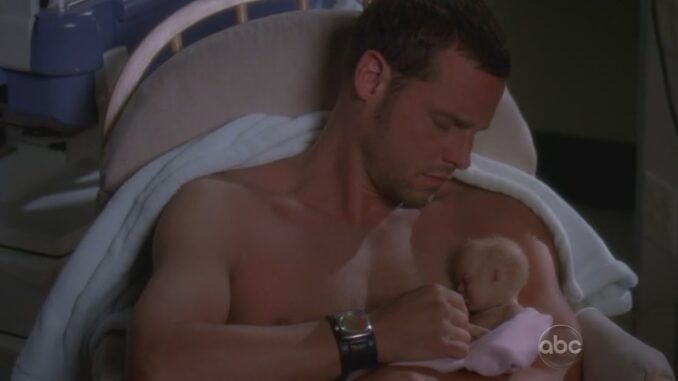
The Unfurling Petals: The Softer Side of Alex with the Baby in Grey's Anatomy
In the chaotic, high-stakes universe of Grey Sloan Memorial Hospital, few characters arrived with as much abrasive cynicism and unvarnished ambition as Alex Karev. Nicknamed "Evil Spawn" in his intern year, he was a walking, talking embodiment of the jerk with a heart of… well, a heart that seemed suspiciously absent. He was rude, self-serving, and often cruel, his sharp tongue a weapon against anyone who dared to show vulnerability. Yet, beneath the layers of bravado and the scowl that seemed permanently etched on his face, lay a surprising, tender core, one that began to unfurl, petal by petal, whenever a baby – particularly a sick, tiny, or helpless one – was placed in his arms.
Alex's initial foray into medicine was driven by a desire for power and prestige, eyeing plastic surgery as a quick route to a lucrative life. Compassion seemed an alien concept. He struggled with patients who demanded emotional investment, often dismissing their anxieties with a gruff wave of his hand. Then came the NICU, the neonatal intensive care unit, a world of miniature lives teetering on the precipice. Here, the cacophony of the emergency room faded into the quiet hum of incubators and the gentle beeps of monitors. It was within these glass walls, amidst the fragility of premature infants, that the first cracks in Alex's formidable facade began to appear.
One of the most poignant and illustrative moments came early in his career, when he was tasked with caring for a micro-preemie, a baby so small and vulnerable it barely seemed real. In a scene that reverberated with unexpected tenderness, Alex, the man who struggled to articulate genuine affection for his peers, would hold the tiny infant, his large, often clumsy hands transforming into instruments of delicate precision. He would talk to the baby, softly, intimately, sometimes about his day, sometimes about his frustrations, sometimes even about Izzie, the woman who alternately tormented and enchanted him. It wasn't the practiced, clinical comfort of a seasoned pediatrician; it was the raw, unburdened outpouring of a soul reaching out to something utterly defenseless. His rasping voice, usually laced with sarcasm, would soften into a melodic murmur, a lullaby whispered against the odds. In those moments, he wasn't Dr. Karev, the resident. He was just Alex, a lost boy finding solace and purpose in the palm of his hand.
This wasn't an isolated incident. The transformation was gradual but undeniable. His initial discomfort around crying infants gave way to a surprising patience. His dismissive attitude towards the worried parents of sick children evolved into a fierce, almost primal protectiveness. He became an advocate for his tiniest patients, fighting for their lives with a tenacity he rarely showed for anything other than his own career advancement. This burgeoning empathy wasn't just a professional shift; it was a deeply personal one, hinting at the fractured childhood he rarely spoke of, perhaps seeing a reflection of his own lost innocence in their fragile forms.
Eventually, this softer side found its professional home. Guided by the discerning eye of Dr. Arizona Robbins, Alex pivoted from plastics to pediatrics, a specialty that demanded an abundance of the very qualities he initially seemed to lack: empathy, patience, and boundless compassion. He became the fiercest champion for children, especially those nobody else wanted – the ones with rare diseases, the ones from troubled homes, the ones who reminded him, perhaps, of himself. The scowl never entirely vanished, but beneath it lay a profound, unwavering commitment.
His interactions with babies extended beyond the hospital walls, cementing his evolution. He was "Uncle Alex" to Meredith and Derek's daughter, Zola, and later to Callie and Arizona's Sofia, handling them with a surprising ease and warmth. These weren't sick children in an incubator; they were just kids, and Alex, the "evil spawn," was utterly charmed by them. His journey culminated in his ultimate decision to leave Seattle and his entire life behind, not for a career opportunity or selfish ambition, but to raise his own biological children, Izzie's twins, a testament to how deeply the call of fatherhood, of protecting innocent lives, had permeated his once-hardened heart.
The softer side of Alex with the baby in Grey's Anatomy wasn't a sudden revelation but a slow, tender unfurling. It was a testament to the idea that even the most damaged individuals possess an innate capacity for love and care, especially when confronted with pure vulnerability. The sight of Alex Karev, the gruff, often loathsome resident, cradling a tiny, fragile life, speaking to it with a voice laced with an unfamiliar tenderness, wasn't just an illustrative moment in his character arc; it was the genesis of his redemption, proving that even the roughest exteriors can hold the most delicate and beautiful of souls.